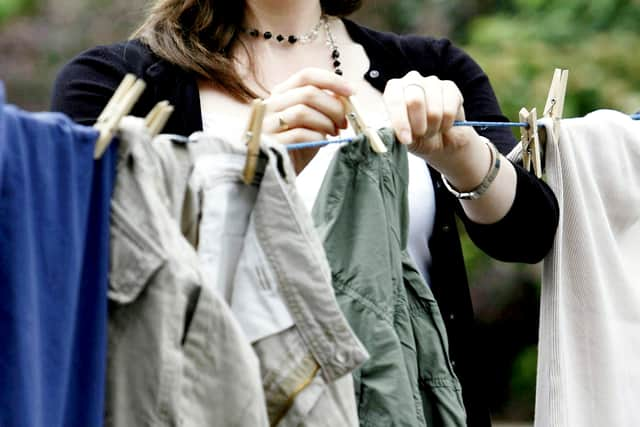Cost of living: Right to dry campaign launches so renters can finally hang their washing outside
A “right to dry” campaign has been launched in order to lend outdoor space to renters - so they can dry their washing outside. Around 1.4 million tenants are subject to contractual clauses which prevent them from displaying clothing outside, while a further 2.7 million renters are left without an area to do this.
New data has revealed that seven in 10 people are unaware such restrictions exist but would happily lend their outdoor space to renters in need. Now Smart PAYG energy firm, Utilita, has launched a campaign with community app Nextdoor.co.uk to match affected tenants with homeowners willing to lend their washing lines.
Advertisement
Hide AdAdvertisement
Hide AdThe poll of 2,000 adults found 36 per cent would offer those affected the opportunity to dry their clothes outside by lending them their own private outdoor space. And 85 per cent wouldn’t be bothered if they spotted a line of clothes hanging out to dry while going about their daily life. As a result, 79 per cent think it is unfair and shouldn’t even be a thing.
Laura Roche, Nextdoor’s managing director, said: “Since the start of the cost-of-living crisis, we’ve seen neighbours go out of their way to help others - whether that’s by batch cooking, offering free repair services or simply hosting a book club. With one in four UK households using the platform, there’s so much potential for neighbours to support each other. We welcome everyone to join the #sharemyair conversation so be the first to tell your area about the great new initiative and, if you can help others, let them know by posting the hashtag on your status.”
The study also found that despite 79 per cent never crossing paths with someone who isn’t allowed to dry laundry outside of their rented property, the same percentage think everyone deserves this right.
Nearly eight in 10 (79 per cent) believe drying inside could cause health issues and 70 per cent raised concerns that they might not have enough room in the house to even do this. While 68 per cent highlighted it could force them to unnecessarily use their tumble dryer - forcing households to spend an extra £26.40 each summer when using the appliance an average three times per week.
Advertisement
Hide AdAdvertisement
Hide AdBut half of those polled predict they would end up using this appliance a lot too if they weren’t allowed to hang their washing up outside. However, 42 per cent revealed they would do it anyway - regardless of the rules.
During the warmer months, the average Brit goes through four loads of washing per week, with 70 per cent claiming hanging clothes out to dry is one of the best things about this time of year. It also emerged 47 per cent of those polled, via OnePoll, feel tenants face too many restrictions and limits.


Aside from the drying ban, 55 per cent think not being allowed to bring in new furniture is an unfair rule to impose, and 42 per cent don’t take kindly to renters not being allowed to install energy efficient measures. According to Utilita experts, the campaign has the power to help the households affected cut their carbon emissions by almost 42 tonnes of Co2 - the equivalent of travelling 11.5 million miles in a standard car - through avoiding tumble dryers during summertime.
George Walters, Utilita’s chief home services officer, said: “Tumble dryers are one of the most energy-hungry appliances and ideally, no one would use one during warmer weather when the sun is shining. Using our smart meter data insights, we have been able to work out exactly what it costs tenants and homeowners without outside space, simply to dry their clothes.
Advertisement
Hide AdAdvertisement
Hide Ad“We believe that everyone should have somewhere to dry laundry outside, and we hope the #sharemyair campaign will provide a solution. Meanwhile, we will lobby for improved drying rights for tenants to help their pockets and the planet.”
Comment Guidelines
National World encourages reader discussion on our stories. User feedback, insights and back-and-forth exchanges add a rich layer of context to reporting. Please review our Community Guidelines before commenting.
